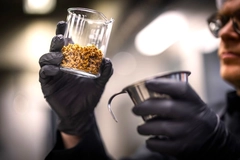
- Industry news
Industry news
- Category news
Category news
- Reports
- Key trends
- Multimedia
- Journal
- Events
- Suppliers
- Home
- Industry news
Industry news
- Category news
Category news
- Reports
- Key trends
- Multimedia
- Events
- Suppliers

Delivering the 27th McDougall Memorial Lecture on food security, the former UN Secretary General and Nobel Peace Prize winner said, "if countries cannot come together successfully to deliver food security – this most basic of human needs – our hopes for wider international co-operation look doomed."

6/27/2011 --- Kofi Annan, chairman of the Alliance for a Green Revolution in Africa, has warned that the current food security crisis, with almost one billion people hungry, could turn into a permanent disaster, endangering millions of lives as well as international cooperation.
"Along with tackling the linked problem of climate change, delivering global food and nutrition security is the challenge of our time,” he said.
Delivering the 27th McDougall Memorial Lecture on food security, the former UN Secretary General and Nobel Peace Prize winner said, "if countries cannot come together successfully to deliver food security – this most basic of human needs – our hopes for wider international co-operation look doomed."
He added that over the past few years there has been "an ominous retreat from the idea of a common purpose based on shared values.
We have seen a worrying rise in protectionism, unilateral export bans, land grabs and exclusive deals that meet the food needs of the rich but not the poor."
Frank Lidgett McDougall, an Australian citizen was one of the founders of what was then the League of Nations’ Food and Agriculture Organisation in 1935. Every two years, before the FAO Conference, the McDougall Lecture is delivered by a prominent personality working in the field of agriculture and hunger alleviation.
Annan said FAO can take the lead in increasing the transparency of global food stocks, and therefore dampening speculation and market volatility, by compiling more accurate and accessible information on the quantity and quality of these stocks.
FAO recently reported that food prices will continue to rise over the next 10 years, threatening the food security of millions of people in developing and even developed countries. World food output will have to rise 70 percent by 2050 as the planet’s population climbs to 9.2 billion from an estimated 6.9 billion in 2010.
Annan was speaking at the opening of the 37th session of the FAO Conference in which the Organisation is expected to elect a new Director General.
In his lecture, the African statesman also hit out at the phenomena of “land grabbing” by which countries are buying or leasing land in other nations to increase their own food security.
"It is very disturbing that a recent report found that agricultural land that adds up to the size of France was bought in Africa in 2009 alone by hedge funds and other speculators," he said.
"It is neither just nor sustainable for farmland to betaken away from communities in this way nor for food to be exported when there is hunger on the doorstep. Local people will not stand for this abuse – and neither should we."
Annan did say, however, that large commercial farms have a role to play but must integrate their activities within communities, serving as a hub to link smallholder farmers to value chains — markets, supermarkets and agribusiness.
The former UN Secretary General also called for more research into the benefits and impacts on food security of crop-based biofuels, for more focus on smallholder farmers and women and emphasised the need for increased research and development.
“Even within existing cultivated land, a doubling of cereal yields would turn Africa into a major food surplus region,” he said.
Annan called for fairer trade rules and farm subsidies, pointing out that OECD countries spend over $385 billion dollars supporting their farmers.
“This, according to Oxfam, was nearly 80 times the money spent in development aid to agriculture – a figure which had fallen by over 70 percent, in real terms, in the previous two decades,” he said.
Meanwhile FAO member nations elected José Graziano da Silva of Brazil as its new Director-General.
Mr Graziano da Silva, 61, received a total of 92 votes out of 180 votes cast.
The election took place on the second day of the 37th Conference of FAO, the highest governing body of the organization.
The European Commission, together with the Food and Agriculture Organisation of the United Nations (FAO), the World Food Programme (WFP) and the International Fund for Agricultural Development (IFAD) have today launched a new Strategic Framework of Cooperation to address food insecurity and malnutrition worldwide. This agreement will be signed during the Annual Meeting of the FAO in Rome and builds on existing agreements with WFP and FAO.
Today, around 925 million of people in the world remain undernourished. The poor are particularly vulnerable to crises, the negative effects of climate change and high food prices. Over the past year, more than 40 million people have been pushed into extreme poverty by an increase in food prices. The three Rome-based Organisations are the key UN forces in food security and nutrition. The European Commission is one of the biggest global donors in the area of food security. Humanitarian food assistance is the single largest aid sector in the EU's humanitarian budget, representing more than € 1,1 billion from 2007 to 2010. Additionally, around €850 million is allocated to fight food insecurity each year through food assistance.
With these institutions joining forces, the international community will be better equipped to achieve better food security and nutrition on the ground both in the short and the longer term.
European Commissioner for Development, Andris Piebalgs said: "No country can exit from poverty and develop with a poorly fed population. Fighting hunger and food insecurity remains at the top of EU priorities, which will be reflected in the upcoming proposals on the future EU development policy. However, we are aware that eradicating hunger cannot be achieved by a single player. Joining forces with UN agencies is the most efficient recipe, which already created success stories such as the eradication of rinderpest this year".
Commissioner Kristalina Georgieva, responsible for International Cooperation, Humanitarian Aid and Crisis Response, said: "We are fully committed to helping ensure that the most vulnerable are adequately fed. An increasing number of people are affected by natural disasters and conflicts, and resources are limited. A challenge of this magnitude requires the cooperation of all of us who share the same goal - to ensure that we deliver aid in the most efficient and effective manner. In the Framework of Cooperation that we are signing, the European Commission emphasizes its support for the three Rome-based agencies."
This agreement reinforces the partnership between all four organisations around a clear and common objective of food security for the most vulnerable while sharing the roles and actions. It will also help foster synergies among the agencies and ensure continuity between relief, rehabilitation and longer term development actions.
For the period 2007-2013, the EU food security policy is financed through:
• the implementation of food security policy at national and regional level is supported by geographical financial instruments. Under the current European Development Fund, Africa alone has received over €1 billion.
• food security issues at global, continental and regional level are addressed by the Food Security Thematic Programme (FSTP). Under the FSTP about €250 million per annum are committed.
• In order to respond rapidly to problems caused by the food crisis in developing countries, the €1 billion Food Facility was launched in 2008 and provides assistance to countries most affected by the crisis over a three-year period 2009-2011. 8 contribution agreements were signed with FAO covering a total of 31 projects in 28 countries for an amount of €229 million (54% for Africa, 33% for Asia and Pacific and 13% for Latin America and Caribbean). In total, more than 50 million people in the world benefited from the Food Facility's support.
The aim of food assistance is to provide the most appropriate response to reduce the food insecurity faced by the most vulnerable people affected by natural disasters and other crises. An appropriate humanitarian food assistance response considers not only food distribution but the whole range of food assistance tools available, for example food-for-work and cash & vouchers. The aim is to ensure that the most effective and efficient response is provided to meet the needs of the most vulnerable in a given crisis context.
Humanitarian food assistance was provided to the most vulnerable people over 50 countries across the globe.











